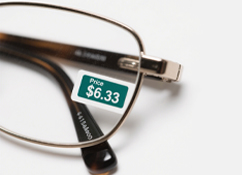How Do Glasses Get Scratched? (And How to Make Them Last Longer)
Plenty of us wear glasses—more than ever, in fact. They’re like a second set of eyes, with the lenses doing all the hard work. But over time, those lenses start to look fuzzy, not as sharp as when they were new. Why? Most of the time, it’s scratches from daily use—and a lot of those come from cleaning them the wrong way. Let’s break down how scratches happen, how to avoid them, and when to replace your lenses.
How Glasses Get Scratched (Spoiler: It’s Usually Your Fault)
Scratches don’t just appear out of nowhere. They’re often caused by tiny, gritty particles (dust, sand, even makeup) grinding against the lens when you wipe them. And we’re all guilty of these two super common bad habits:
Bad Habit #1: Wiping with Your Shirt
You know the drill: Take off your glasses, yank the corner of your shirt, breathe on the lenses, and rub hard. Sounds quick, but your shirt traps dust and lint—so you’re basically sanding your lenses every time you do this.
Bad Habit #2: Scrubbing with Tissues
Tissues (or paper towels) feel soft, but they’re actually rough—they have tiny fibers that scratch resin lenses. Rubbing like mad? Even worse. Those little scratches add up, making your lenses look cloudy.
The Right Way to Clean Glasses (No Scratches Guaranteed)
Cleaning your glasses doesn’t have to be complicated—just follow these steps:
Rinse first: Take off your glasses and run the lenses under lukewarm running water. This washes away dust, grit, and any sticky stuff (like makeup or sunscreen) so they don’t scratch the lens when you wipe.
Add a little soap (if needed): If there’s oil or smudges, put a tiny drop of mild dish soap (like Dawn) on your fingertips. Gently rub both sides of the lenses—no scrubbing!
Rinse again: Make sure all the soap is gone—suds left behind dry into streaks.
Blot dry: Use a clean, soft microfiber lens cloth (the kind that comes with glasses) and blot the water off—don’t rub back and forth. Blotting avoids dragging any remaining particles across the lens.
What to Avoid (These Ruin Lenses Fast)
Alcohol: Whether it’s rubbing alcohol or alcohol-based lens wipes, it breaks down the protective coatings on your lenses (like anti-glare or scratch-resistant layers). Over time, this makes coatings peel or cloud up. Stick to water and dish soap.
Dry wiping: Even with a lens cloth, wiping dry lenses is a bad idea—any dust on the cloth will scratch the lens. Always rinse first!
Hard surfaces: Setting your glasses lens-down on tables, counters, or your phone? That’s a surefire way to get scratches from grit on the surface.
Pick Scratch-Resistant Lenses (They’re Worth It)
Not all lenses are created equal. Scratch-resistant lenses (from reputable brands) have a tough coating that stands up better to daily wear and tear. They’re not 100% scratch-proof, but they’ll last way longer than basic lenses—especially if you clean them right.
When Do You Need to Replace Scratched Lenses?
A few tiny scratches might not bother you, but it’s time for new lenses if:
Scratches are in the center of the lens (not just the edges) and make things blurry.
There are so many small scratches that the lens looks hazy—this reduces how much light gets through, making your vision dimmer.
Scratches have caused the coating to peel or crack—this messes with your prescription, so your glasses won’t correct your vision as well.
FAQ: Scratched Glasses & Care
Q: Can I fix a scratched lens at home?
A: Maybe small ones! Try a tiny bit of non-whitening toothpaste: Rub it gently on the scratch with your finger, then rinse. But deep scratches? They’re permanent—time for new lenses.
Q: Are microfiber cloths really better?
A: Yes! They’re designed to trap dust instead of dragging it across the lens. Just make sure to wash them occasionally (in mild soap, no fabric softener) to keep them clean.
Q: How often should I clean my glasses?
A: Once a day, or whenever they feel smudged. The longer dust sits, the more likely it is to scratch when you finally wipe.
Final Thought
Your glasses work hard to help you see—taking 30 seconds to clean them right can make them last years instead of months. Skip the shirt or tissues, rinse first, and blot dry. Your lenses (and your vision) will thank you.











